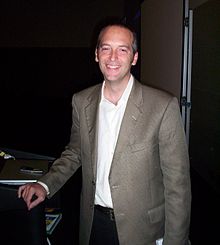John F. Hartwig
John F. Hartwig | |
|---|---|
 John Hartwig at the 2007 Boston ACS meeting | |
| Born | John F. Hartwig 1964 (Elmhurst, IL) |
| Nationality (legal) | American |
| Alma mater | Ph.D (1990) University of California, Berkeley A.B. (1986) Princeton University |
| Known for | Organometallic chemistry, inorganic chemistry, Catalysis |
| Awards | Willard Gibbs Award (2015) Wolf Prize in Chemistry (2019) |
| Scientific career | |
| Fields | Chemistry |
| Institutions | University of California, Berkeley |
| Doctoral advisors | Robert G. Bergman and Richard A. Anderson |
John F. Hartwig is the Henry Rapoport Professor of Chemistry at the University of California, Berkeley. His laboratory focuses on developing new methods for the preparation of a broad range of organic compounds. His explorations have illustrated the potential of the transition metal-catalyzed construction of important carbon-carbon and carbon-heteroatom linkages in a way that has elevated such transformations to strategy level reactions.
Hartwig is known for helping develop the Buchwald–Hartwig amination, a chemical reaction used in organic chemistry for the synthesis of carbon–nitrogen bonds via the palladium-catalyzed cross-coupling of amines with aryl halides. Here is an example of this reaction:

He also helped develop a technique for steric-directed C–H borylation of arenes.[1] The versatility of this method is described in the following reaction scheme:

Hartwig received his A.B. from Princeton University in 1986, and earned his Ph.D. in Chemistry from the University of California, Berkeley in 1990.
Career
- 1984: General Electric Research and Development, Schenectady, NY
- 1985: Monsanto Japan Ltd., Kawachi, Japan
- 1986-1989: University of California, Berkeley, Berkeley, CA Graduate Student Instructor.
- 1990 - 1992: Massachusetts Institute of Technology, Cambridge, MA American Cancer Society Postdoctoral Associate.
- 1992-1996: Yale University, New Haven, CT Assistant Professor of Chemistry.
- 1996-1998: Yale University, New Haven, CT Associate Professor of Chemistry.
- 1998-2004: Yale University, New Haven, CT Professor of Chemistry.
- 2004-2006: Yale University, New Haven, CT Irénée duPont Professor of Chemistry
- 2006-2011: University of Illinois at Urbana–Champaign, Kenneth L. Reinhart Jr. Professor of Chemistry.
- 2011–present: Lawrence Berkeley National Laboratory, Berkeley Senior Faculty Scientist
- 2011–present: University of California, Berkeley Henry Rapoport Professor of Chemistry.
Academy Memberships and Fellowships
- 2015: Member, American Academy of Arts and Sciences[2]
- 2012: Member, National Academy of Sciences
- 2005: Fellow of the American Association for the Advancement of Science
Major Awards
| 2019 | Wolf Prize in Chemistry[3] |
| 2015 | Willard Gibbs Award[4] |
| 2014 | Janssen Pharmaceutical Prize |
| 2013 | Herbert C. Brown Award for Creative Research in Synthetic Methods[6] |
| 2010 | GlaxoSmithKline Scholars Award |
| 2009 | National Institutes of Health MERIT Award |
| 2009 | Edward Mack Jr. Memorial Award, Ohio State University |
| 2009 | Mitsui Chemicals Catalysis Science Award, Japan[7] |
| 2009 | Joseph Chatt Award of the Royal Society of Chemistry[8] |
| 2008 | International Catalysis Award from the International Association of Catalysis Society[9] |
| 2008 | Mukaiyama Award from the Society of Synthetic Organic Chemistry, Japan[10] |
| 2008 | Paul N. Rylander Award of the Organic Reactions Catalysis Society |
| 2007 | Raymond and Beverly Sackler Prize in the Physical Sciences |
| 2007 | Tetrahedron Young Investigator Award in Organic Synthesis[11] |
| 2006 | ACS Award in Organometallic Chemistry[12] |
| 2004 | Thieme-IUPAC Prize in Synthetic Organic Chemistry[13] |
| 2003 | Leo Hendrik Baekeland Award[14] |
| 1998 | Arthur C. Cope Scholar Award[15] |
| 1997 | Camille Dreyfus Teacher-Scholar Award[16] |
| 1992 | Dreyfus Foundation New Faculty Award |
Publications
- Hartwig, John (2010). Organotransition Metal Chemistry: From Bonding to Catalysis. New York: University Science Books. p. 1160. ISBN 978-1-938787-15-7.
References
- ^ Hartwig, J.F. Accounts of Chemical Research 2012, 45, 864-873.
- ^ American Academy of Arts and Sciences - 2015 Class list
- ^ Wolf Prize 2019 - Jerusalem Post
- ^ American Chemical Society - Chicago Section
- ^ Nagoya Medals of Organic Chemistry 2014
- ^ ACS Awards - Herbert C. Brown Award for Creative Research in Synthetic Methods
- ^ Mitsui Chemicals Catalysis Science Award
- ^ RSC Joseph Chatt Award page
- ^ The International Association of the Catalysis Societies
- ^ Society of Synthetic Organic Chemistry, Japan - "What's the Mukaiyama Award?
- ^ Tetrahedron Young Investigator Award Archived 2015-04-19 at the Wayback Machine
- ^ ACS Awards - ACS Award in Organometallic Chemistry
- ^ Thieme-IUPAC Prize in Synthetic Organic Chemistry (Previous Winners)
- ^ American Chemical Society - North Jersey Section (Awards)
- ^ ACS Awards - Arthur C. Cope Scholar Awards Archived 2015-06-09 at the Wayback Machine
- ^ Camille Dreyfus Teacher-Scholar Awards
